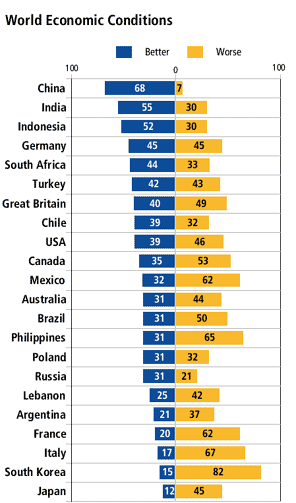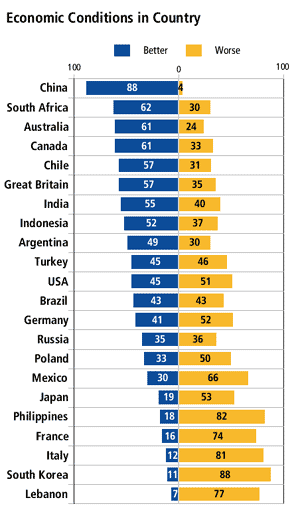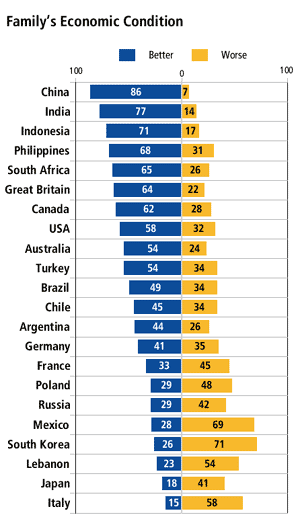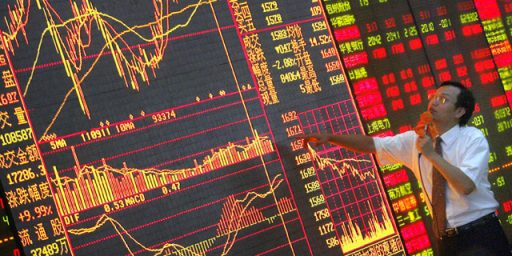Is Global Income Inequality Growing or Declining?
If I were to ask you this question, how would you respond? I think that you’d be wise to seek clarification and say: “It depends on how you define ‘global income inequality.'” If you look at each country one by one, you’ll find income inequality growing within a large number of them, including the United States.
But, if you look at the world as a whole and measure income from this aggregate scale, you’ll find income inequality declining. Here’s why:
“The main thing that is driving this is rapid income growth in China and southern Asia,” says Dr. Glenn Firebaugh, professor of sociology and demography, and author of the book, “The New Geography of Global Income Inequality, ” published [in 2003] by Harvard University Press.
“On average, incomes world wide are increasing at a little less than 2 percent a year, but China is increasing at about 6 percent,” Firebaugh explains. “About 40 percent of the world’s population lives in China or south Asia, and with such a substantial portion of the world’s population moving up in income, this has been compressing income inequality worldwide.
“This represents a turnaround over historic trends,” he adds. “Over the 19th century and the first half of the 20th, global income inequality exploded, but in the last 25 to 30 years it has been on the decline. This is a real sea change in global income inequality.”
Xavier Sala-i-Martin of Columbia has similar data.
I highlight these statistics not only because they’re among the most interesting bits that I learned in the fall semester, but also because the Chinese economy’s been in the news lately:
Growth Up and Inflation Down in China (NYT)
Economic growth in China accelerated to 9.5 percent in the fourth quarter, computed from the year-earlier period, while inflation slowed, the National Bureau of Statistics said Tuesday. Chinese officials promised to maintain controls on speculators, but took no new measures to temper economic growth.
But just nine months after the Chinese economy seemed on the verge of an upward spiral of higher wages and prices, Beijing appears to have kept growth at a brisk pace while bringing inflation under control. Still, private-sector and academic economists are deeply divided over whether inflation can remain low, as Chinese leaders have eased some of the controls they imposed last spring.
Growth had declined to 9.1 percent in the third quarter, compared with the year-earlier period, and had been expected to fall further in the fourth.
The growth rate for all of 2004 was also 9.5 percent, despite the government’s stated goal of lowering growth from the 9.3 percent pace of 2003 to try to calm inflation.
Given these trends, it should come as no surprise that the Chinese are currently the most optimistic people in the world about the global economy, their national economy, and their family’s economic conditions:



As the Program on International Policy Attitudes points out, the Chinese are the exception, since “most are pessimistic about the global economy.” Indeed, even the gaps between China and India are likely greater now: the survey was completed mostly before the tsunami.





Looking only at the USA line, I find it very interesting that (smallish) majorities see Economic conditions in the World and in the Country as getting worse, yet a wide margin see their own getting better. You’d think more people would exptrapolate their own circumstances to others, instead of, as the data seems to suggest, concluding that they’re the exception.
All that left-wing “talking down the economy” last year seems to have had an effect after all.
Well, Dodd, when was the last time you saw a news report or article about middle-class Africans or South Americans? Given the way the rest of the world is covered, the media’s focus in Iraq becomes much less surprising.
Of course income inequality is probably the wrong thing to be looking at, anyway. If things are getting steadily better for the folks on the bottom, who cares if things are getting much better for the folks on the top? (Oh, wait – I know the answer to that question – Socialists and Liberals.)
Uh, actually capitalists. If you care about your investments, then you pay pretty decent attention to the gap between the rich and the poor. According to that bastion of liberal thinking known as the RAND corporation, the gap between the rich and the poor is a strong indicator of how unstable the country will be, and therefore, BAD FOR YOUR INVESTMENT.
Economic measurements devoid of context — like such one-dimensional measures as “income inequality” — are useless except for making political arguments that can only survive when devoid of context.